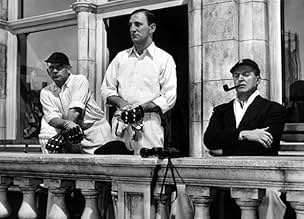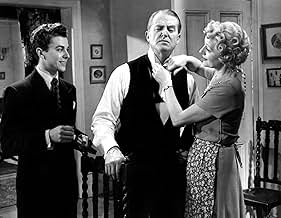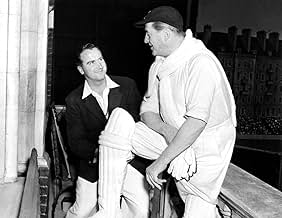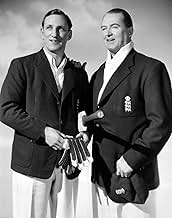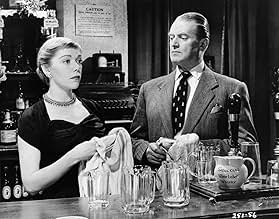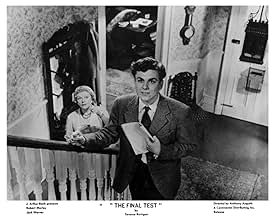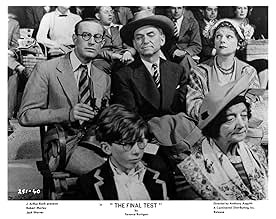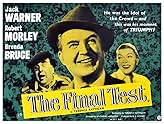Agrega una trama en tu idiomaSam Palmer is a cricketer about to play the final test match of his career. His schoolboy son Reggie is a budding poet who disappoints him by not attending the penultimate day's play. Unexpe... Leer todoSam Palmer is a cricketer about to play the final test match of his career. His schoolboy son Reggie is a budding poet who disappoints him by not attending the penultimate day's play. Unexpectedly, Reggie is invited to the home of poet and writer Alexander Whitehead. Reggie fears... Leer todoSam Palmer is a cricketer about to play the final test match of his career. His schoolboy son Reggie is a budding poet who disappoints him by not attending the penultimate day's play. Unexpectedly, Reggie is invited to the home of poet and writer Alexander Whitehead. Reggie fears he will also miss the final day--and therefore Sam's last innings--but it turns out that ... Leer todo
- Cricket Match Spectator
- (sin créditos)
- Frank Weller
- (sin créditos)
Opiniones destacadas
Quickly filmed after being one of the earliest British TV plays by an established writer, "The Final Test" is a cheap and cheerful comedy. Documentary footage of real play at the Oval, South London, is hardly up to "Zelig" standards in melding into the studio shots. The film stocks do not match, and the crowd's rush into the ground is evidently back-projected. The setting is less grand than one associates with Rattigan. It is Cowardesque in the vein of "This Happy Breed", with a sauce bottle on the dinner table: the hero, Sam Palmer, is a professional batsman who has done well enough to give his son a fee-paying education. The only "posh" character besides Wattis is Robert Morley's pompous poet and playwright, whom the literary-minded son would rather visit than watch his dad play his last innings against the Australian tourists. Luckily Morley proves to be a cricket maniac and all ends well.
Jack Warner's remarkable, belated rise from fairly blue music hall comic and Maurice Chevalier impersonator to one of Britain's leading character actors is consolidated here. He can be humorous, gruff, judicious... and all in the same scene if required. There is no trace of the over-expressiveness of so many comedians trying to act. Though pushing 60, Warner looks no older than the real doyen of the English side, Cyril Washbrook, who along with a handful of colleagues nervously plays himself (no role is harder for a non-pro). The widowed Warner has a fancy for a barmaid at his local pub, the gaunt Brenda Bruce, and he has his own retirement dilemmas to resolve: should he marry a woman who may have a past, and should he take a job coaching boys at Eton when his son is about to go to Oxford and mingle with Etonians on level terms?
"The Final Test" therefore has a few gentle remarks to drop about changing social values and snobberies in post-war Britain. Sam's captain, Len Hutton, urges him not to fuss so much about the pecking order: an amusing way of using a real-life character, since the great Yorkshireman was England's first professional cricket captain and would soon be knighted. Morley's TV play "Following a Turtle to My Father's Tomb", which Sam's son watches in rapture and which drives Sam out to the pub, is a spoof of the middlebrow poetic drama (TS Eliot, Christopher Fry) then in vogue, which Rattigan did not admire. One line, "the great dome of discovery that men call the sky", takes off the exhibit of that name in the recent Festival of Britain.
The deserved rehabilitation of Rattigan, with the likes of David Mamet doing him homage, gives fresh interest to a script which takes the boulevard playsmith outside his usual range. No doubt the film technicians' union approved the democratic spirit, since this was one of its occasional efforts, via ACT Films, at keeping its members in work. Director "Puffin" Asquith, though the son of an earl and ex-prime minister, was a keen union activist. Sam Palmer was Jack Warner's last big film part for a decade. He was soon to resurrect his slain copper from "The Blue Lamp" and become TV's most famous PC in "Dixon of Dock Green."
It's directed by Anthony Asquith from a script by Terence Rattigan; originally it was broadcast by the BBC with an entirely different cast. Although Warner and Morley are wonderful, with Morley playing another of his very English eccentrics, it's a little too neatly drawn a script to be among Rattigan's best; in fact, at times it seems derivative of movies like PRIDE OF THE YANKEES. It even has an American character in an effort to let the transatlantic audience have some cultural understanding of this game.
I don't know how successful it was in the theaters, but there's little doubt that when Morley or Warner are on screen, they're lots of fun.
There is humour and a great deal of emotion, there is also a splendid performance from Jack Warner who really surprised me with his sensitive portrayal of a proud cricketer and father. Robert Morley hams it up as usual and there is the delight of a Richard Wattis cameo to add icing to this wonderful cake.
All in all, this is a joy to watch; intelligent and witty thanks to Terrance Rattigan's sharp script. I love cricket, but those that know nothing of it will still get a great deal of pleasure from this cracking film.
¿Sabías que…?
- TriviaIn the opening scene, shot in London Waterloo railway station, the film of the locomotive arriving at the platform is flipped left-to-right, as revealed by the mirror-reversed number on the side of the locomotive cab. This was most likely intentional, so that in the next shot the platform is on the same side of the train.
- ErroresAt the end of the first day of England's innings it is said that they scored 320. The next day on the radio, John Arlott says 283.
- Citas
Reggie Palmer: I'm afraid I don't awfully like cricket.
Alexander Whitehead: Don't you really? I have heard of such people.
- ConexionesRemade as The Final Test (1961)
Selecciones populares
Detalles
- Fecha de lanzamiento
- País de origen
- Idioma
- También se conoce como
- Poslednja provera
- Locaciones de filmación
- Pinewood Studios, Iver Heath, Buckinghamshire, Inglaterra, Reino Unido(studio: made at Pinewood Studios, England)
- Productoras
- Ver más créditos de la compañía en IMDbPro
- Tiempo de ejecución
- 1h 30min(90 min)
- Color
- Relación de aspecto
- 1.37 : 1

